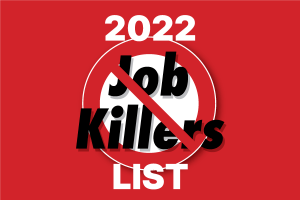Over the course of the last two weeks, the California Chamber of Commerce released and has been building its 2022 job killer list. After its latest additions, the CalChamber job killer list includes a total of 15 bills, including two carry-over proposals from 2021, and CalChamber expects to add several more bills to the list in the coming weeks.
“California companies are the economic engine that drives innovation and job creation in our state and are responsible for the record revenues the state is currently experiencing,” said CalChamber President and CEO Jennifer Barrera. “Yet, the bills on this year’s job killer list reflect a lack of appreciation of the economic realities and regulatory challenges employers — and especially small business employers — face as they continue to emerge from the impacts of this pandemic. A shrinking workforce coupled with California’s oppressive legal climate, penchant for overregulation, and continued push for even higher taxes, will hamper the ability of California companies to remain competitive in the future. This year’s job killer list highlights policies that will hurt job creation and will shut down or reduce investment in our economy.”
The 2022 CalChamber Job Killer List includes the following employment-related bills:
Labor and Employment
AB 2095 (Kalra; D-San Jose) Unfair Denial of State Opportunities. Places new onerous administrative burdens on employers by requiring annual reporting of wage and hour data and employee benefits on an employer’s entire United States workforce that will unfairly criticize employers for lawful conduct by publishing that data on the Labor and Workforce Development Agency’s website and using such data to rank employers and deny them state opportunities, and will subject employers to frivolous litigation and settlement demands.
AB 2182 (Wicks; D-Oakland) Expansion of Duty to Accommodate Employees and Litigation Under the FEHA. Imposes new burdens on employers to accommodate any employee with family responsibilities, which will essentially include a new, uncapped protected leave for employees to request time off and exposes employers to costly litigation under the Fair Employment and Housing Act by asserting that any adverse employment action was in relation to the employee’s family responsibilities, rather than a violation of employment policies.
AB 2183 (Stone; D-Scotts Valley) Forced Unionization Process for Agricultural Employees. Limits an employee’s ability to independently and privately vote for unionization in the workplace, by essentially eliminating a secret ballot election and replacing it with the submission of representation cards signed by over 50% of the employees, which leaves employees susceptible to coercion and manipulation by labor organizations. Also, unfairly limits an employer’s ability to challenge the cards submitted by forcing employers to post an unreasonable bond, and then limits an employee’s ability to decertify a union, by forcing them to go through the ballot election process instead of submission of representation cards. Also includes an unnecessary presumption of retaliation that is effectively unlimited in scope because it would apply for the duration of an election campaign, which could last for a year or more.
AB 2188 (Quirk; D-Hayward) Limits Employers’ Ability to Keep Workplace Drug-Free. Risks workplace safety by promoting marijuana use to a protected class under California’s discrimination law, on par with national origin or religion. Also effectively prohibits pre-employment drug testing, harming employers’ ability to keep their workplace safe and drug free. In addition, would prohibit use of traditional marijuana tests, such as urine and hair testing, and compel employers to utilize saliva-based testing.
AB 2932 (Low; D-Campbell) Increased Overtime Requirement. Significantly increases labor costs by imposing an overtime pay requirement after 32 hours and other requirements that are impossible to comply with, exposing employers to litigation under the Private Attorneys General Act (PAGA).
SB 1044 (Durazo; D-Los Angeles) State of Emergency. Allows employees to leave work or refuse to show up to work if employee subjectively feels unsafe regardless of existing health and safety standards or whether employer has provided health and safety protections and subjects employers to costly Private Attorneys General Act (PAGA) lawsuits if they dispute the employee’s decision or need to have another employee take over any job duties.
SB 1162 (Limón; D-Goleta) Publication of Pay Data. Encourages litigation against employers based on the publication of broad, unreliable data collected by the state. Undermines employers’ ability to hire, imposes administrative and record keeping requirements that are impossible to implement and subjects employers to a private right of action and penalties under the Private Attorneys General Act (PAGA).
Privacy and Cybersecurity
SB 1189 (Wieckowski; D-Fremont) New Private Right of Action for Biometric Information. Creates legal liability for businesses large and small, potentially in the millions to tens of millions of dollars, while not providing any exceptions, such as for the use of biometric data for safety, security or other reasonable purposes. Also imposes new, untenable restrictions on the use and disclosure of biometric information in a thinly veiled attempt to undermine the California Privacy Rights Act (CPRA) limited private right of action for data breaches.
Workers’ Compensation
SB 213 (Cortese; D-San Jose) Workers’ Compensation Presumption: Hospital Employees. Expands Costly Presumption of Injury. Significantly increases workers’ compensation costs for public and private hospitals by presuming certain diseases and injuries are caused by the workplace and establishes an extremely concerning precedent for expanding presumptions into the private sector. 2021 carry-over bill.
Read the complete 2022 Job Killer list.





